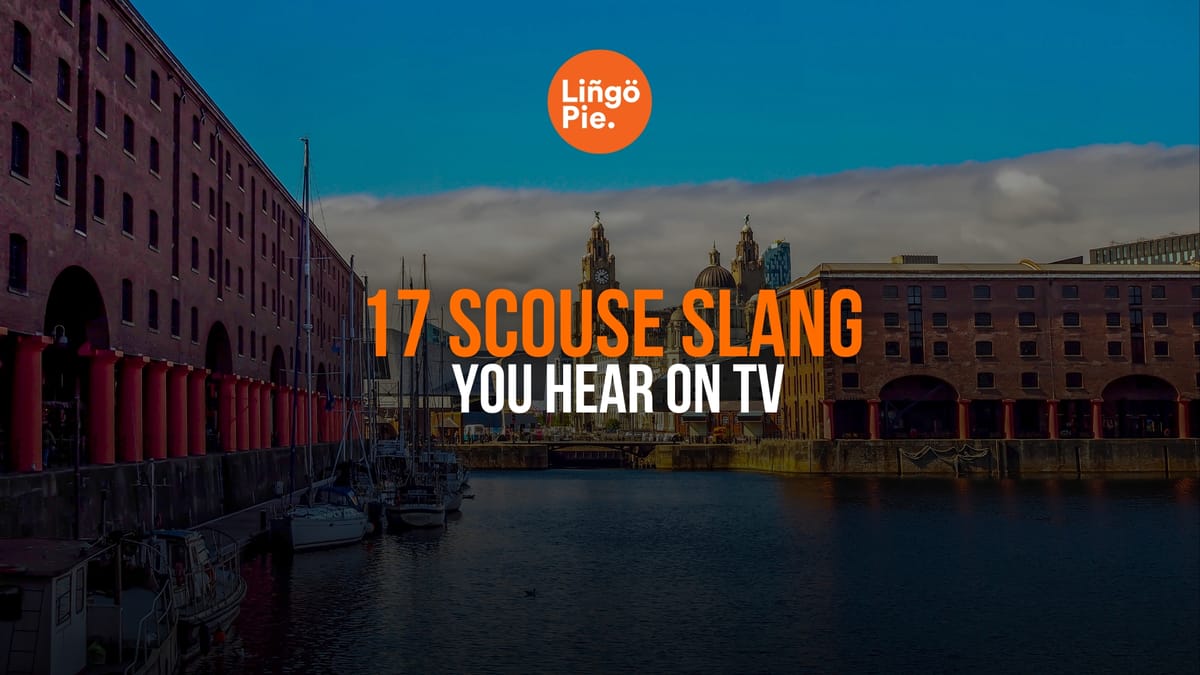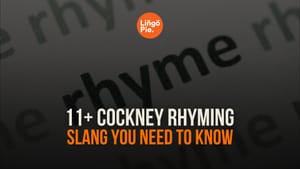Think English is just one language? Spend five minutes in Liverpool and you’ll think again. Scouse slang is actually in its own league with its set of sharp, playful, and proudly local expressions. If you’ve ever wondered what it means when someone says “That’s boss, la” or complains it’s “baltic out,” you’re in the right place.
In this guide, we’ll break down the most iconic Scouse terms, explain what they mean, and show you how to actually use them. Whether you're planning a visit, watching a Liverpool-based show, or just curious about regional slang, this is your shortcut to sounding a bit more like a local.
- 25+ Greek Slang Words That Make You Sound Like a Local
- 20+ Polish Slang Words You Need In Your Life
- 20+ Easy Spanish Slang Words And Phrases [Guide]

What Is Scouse Slang?
Scouse slang is the unique way people from Liverpool and Merseyside speak. The name "Scouse" comes from "lobscouse," a stew once popular with local dock workers. Like the stew, the dialect developed as a mix of influences from Irish, Welsh, Scottish, and Scandinavian immigrants who settled in this major port city.
What Is The Liverpool Scouse Accent?
The Liverpool Scouse accent is one of Britain's most recognizable regional accents, characterized by its distinctive intonation patterns, vowel sounds, and almost sing-song delivery. Some of the key features of the Scouse accent include
- Pronouncing "th" sounds as "d" or "f" (so "think" becomes "fink")
- Flattening certain vowels
- Adding a nasal quality to many words
The accent also tends to be spoken quite quickly, which compounds the challenge for language learners who are already struggling to decode unfamiliar slang terms.
Scouse Slang Words And Phrases
Boss
This is Liverpool's signature word meaning "excellent," "brilliant," or "fantastic." It's the Scouse equivalent of saying something is really good, and you'll hear it constantly in Liverpool TV shows and conversations. The word has become so associated with Liverpool that tourists often try to use it themselves, though locals can usually spot a non-native speaker attempting Scouse from a mile away.
Sound
When someone says something is "sound," they mean it's good, okay, or agreeable. This versatile word works as both an adjective ("That's sound, mate") and as a way to show you're okay with something someone's suggesting. You'll often hear it combined with other phrases like "sound as a pound" for extra emphasis.
Scran
This simply means food, but it's used so frequently in Liverpool that you'll hear it everywhere from casual conversations to cooking shows. The word originated from naval slang meaning any scraps of food sailors could find, which fits perfectly with Liverpool's maritime heritage. Whether someone's talking about grabbing a quick bite or planning a proper meal, "scran" covers it all.
Baltic
When Liverpudlians say it's "baltic," they mean it's absolutely freezing cold. The term comes from Liverpool's Baltic Triangle area, which was named after goods imported from the notoriously cold Baltic Sea region. It's become the go-to word for describing harsh winter weather, and you'll hear it constantly during Liverpool's chilly months.

Bevvy
Short for "beverage," this usually refers to alcoholic drinks, though it can mean any drink depending on context. If someone suggests "going for a bevvy," they're inviting you out for drinks, typically at a pub. The word appears frequently in British TV shows set in Liverpool, often accompanied by gestures that make the meaning clear even to non-native speakers.
Wool
This playful term refers to someone from areas around Liverpool but not actually from the city itself, particularly places like the Wirral, St. Helens, or Runcorn. The nickname supposedly comes from workers carrying wool bales when traveling to Liverpool for work. It's used teasingly rather than maliciously, though non-locals might not immediately realize they're being called out for their geographic origins.
Clobber
This word means clothes or clothing, and you'll hear it used when someone's talking about getting dressed up or buying new outfits. It's particularly common among younger Liverpudlians and appears frequently in British TV shows featuring shopping scenes or fashion discussions.

Jarg
When something is "jarg," it means it's fake, broken, or not working properly. You might hear someone complain that their phone is "acting all jarg" when it's malfunctioning, or describe counterfeit goods as "jarg." The term is incredibly useful for describing anything that's not quite right, from faulty electronics to suspicious-looking designer handbags.
Devoed
Short for "devastated," this expresses disappointment ranging from mild annoyance to genuine upset. Someone might be "proper devoed" about missing their favorite TV show or "absolutely devoed" about more serious disappointments. The shortened form makes it feel less dramatic than saying "devastated," allowing Liverpudlians to express disappointment with characteristic humor.
Bizzies
This is Liverpool slang for police officers, and you'll hear it in crime dramas, news reports, and casual conversation. The term supposedly comes from police being "busy" or "busybodies" who stick their noses into everyone's business.
Made Up
In Liverpool, being "made up" means you're extremely happy or thrilled about something. If someone gets good news, they might say they're "absolutely made up" about it, which can confuse learners who know "made up" as meaning "fictional."

Antwacky
This describes something old-fashioned, outdated, or from a different era. You might hear someone describe vintage clothes as "proper antwacky" or dismiss old technology as "a bit antwacky." The word is slightly mocking, suggesting that whatever's being described is charmingly out of touch with modern times.
Chocka
Meaning "extremely busy" or "completely full," this word comes from the nautical term "chockablock." You'll hear it when describing crowded places ("The pub was absolutely chocka") or busy schedules ("I'm chocka this weekend"). Liverpool's maritime history shows up constantly in local slang, making these terms feel natural to locals but puzzling to outsiders.
Give Us a Bell
This friendly phrase means "give me a call" or "phone me," though it can also mean dropping by someone's house. It's a casual way to suggest future contact and appears frequently in British TV shows during farewell scenes.

Our Kid
Pronounced "are kid," this refers to a sibling, close relative, or sometimes just a good friend. You'll hear people say "me and our kid" when talking about plans with family members.
Scally
This term describes someone who's causing trouble, acting roughly, or behaving inappropriately. While it can be used seriously about actual troublemakers, it's often applied playfully among friends who are just messing around.
G'wed
This enthusiastic expression means "go ahead" or "go on then" and is used to encourage someone or show agreement. You might hear it when someone's cheering on a football player ("G'wed lad!") or agreeing to stay for another drink.
- 10 Best British TV Shows To Learn English
- 19+ Hilarious British Slang Terms to Spice Up Your Vocab
- 11+ Cockney Rhyming Slang You Need To Know
Learn A Language With Lingopie
Scouse slang is a perfect reminder that real language isn't textbook perfect. It's full of local phrases, cultural references, and expressions that apps and formal lessons rarely cover. If this post inspired you to learn slang in other foreign languages, then be sure to check out Lingopie!
Lingopie helps you learn the way people actually speak by offering real TV shows from around the world. With interactive dual subtitles and advanced learning features, you'll pick up natural language in context, not just vocabulary lists.
Whether you're following a British drama or a Spanish sitcom, Lingopie let’s you learn how the language lives, sounds, and feels in real conversation. Give it a try now!
FAQ
What does Scouse mean in British slang?
"Scouse" refers to both the Liverpool accent and dialect, as well as people from Liverpool. It's short for "lobscouse," a type of stew once common among local sailors.
What is a jigger in Liverpool slang?
In Liverpool slang, a "jigger" means an alleyway or narrow passage between buildings. It's commonly used in working-class neighborhoods.
What does Ken mean in Liverpool?
"Ken" is used in some parts of Liverpool to mean “know” or “understand,” similar to the Scottish usage. For example, “Do you ken what I mean?”
Why do they call Liverpool Scouse?
The nickname comes from "lobscouse," a stew eaten by sailors and dock workers. Over time, "Scouse" came to represent the people, accent, and culture of Liverpool.
Is Scouser a slur?
No, "Scouser" is not a slur — it's a casual term for someone from Liverpool. However, context and tone can make it sound offensive if used negatively by outsiders.
What does Ozzy mean in Liverpool?
In Liverpool slang, "Ozzy" is short for hospital. For example, someone might say, “He’s gone to the Ozzy.”






![20+ Gen Alpha Slang And What They Mean [Guide]](/blog/content/images/size/w300/2025/06/Gen-Alpha-Slang.jpg)

